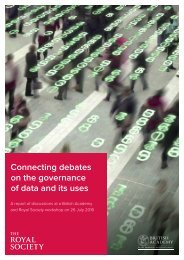BIG DATA
VodafoneInstitute-Survey-BigData-Highlights-en
VodafoneInstitute-Survey-BigData-Highlights-en
Create successful ePaper yourself
Turn your PDF publications into a flip-book with our unique Google optimized e-Paper software.
<strong>BIG</strong> <strong>DATA</strong> – opportunities AND RISKS<br />
or social media. And they are more open-minded about<br />
the use of health data as it can lead to more effective<br />
diagnosis and treatment. Equally pragmatic yet consistent<br />
are their red lines: financial privacy seems crucial, as are<br />
clear prohibitions of personal health data being reused<br />
by insurers (rather than aiding medical intervention). And<br />
though companies may reuse personal data, handing<br />
such data over to third parties is a distinct no-no for most<br />
in the survey.<br />
I see two important messages emerge from this valuable<br />
study. The first surely is humbling for the European data<br />
protection elite. The people do not find the current mechanisms<br />
in place to protect personal data to be effective.<br />
This requires new thinking. Policymakers are tasked to<br />
come up with better ways to protect personal data; ways<br />
that acknowledge the complexity of Big Data analytics and<br />
the resulting limitations of individual informed consent.<br />
Unfortunately, policymakers are struggling to take this<br />
– I believe valid – criticism of the people to heart, and to<br />
come up with new, more effective mechanisms to protect<br />
personal data.<br />
This is lamentable, because an obvious alternative<br />
exists: regulation. Rather than asking individuals to consent<br />
to something they don’t (and have no realistic chance<br />
of) understanding, we could regulate the use of personal<br />
data by companies and governments, interdicting irresponsible<br />
and unaccountable behaviour. We already do<br />
this in many other areas that have gotten too complex for<br />
individuals to comprehend. We don’t expect people to test<br />
themselves the medication or the food they buy. Rather,<br />
we have regulations, regulators, and regulatory agencies,<br />
which have put in place stringent processes of checks and<br />
oversight. Neither are we expecting individuals to make<br />
choices about wearing seatbelts in cars. Because not<br />
being buckled up is so dangerous, we have just mandated<br />
their use. I strongly believe we will have to do the same<br />
to protect personal data in the age of Big Data, and shift<br />
much of the burden of data protection from individual consent<br />
to regulating accountable and responsible data use.<br />
This does not necessarily have to stifle Big Data innovation<br />
– on the contrary: permitting responsible data use (including<br />
repurposing of personal data) without individual consent<br />
can create space for innovative experimentation by<br />
responsible data users. It’s time we tell the policymakers!<br />
The second, equally important message is that for all the<br />
hyperbole and rhetoric around Big Data, companies and<br />
governments so far have failed to make a compelling case<br />
to the people why Big Data has strong positive individual<br />
and social value. Moreover, the revelations about data<br />
misuse from private companies all the way to democratic<br />
governments (as evidenced in the Snowden files) have not<br />
helped build and maintain trust by the people that their<br />
personal data is used appropriately. Here, companies and<br />
governments need to act, because without trust of the<br />
people Big Data cannot flourish. My personal sense is that<br />
Big Data if done responsibly holds tremendous societal<br />
value. So I wish for this trust to be built. But I fully recognise<br />
that it is up to the data users to create and preserve<br />
that trust.<br />
I believe these two crucially important messages coming<br />
out of this study suggest ample and imperative calls for<br />
action by policymakers and stakeholders alike. As an<br />
optimist, I can but hope they will heed the call. But there is<br />
so much more this important survey offers. That is precisely<br />
its distinct and lasting value: to offer both narrative and<br />
nuance on an issue of seminal importance for the future of<br />
our society.<br />
5






